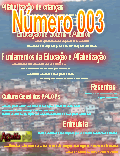O currículo e a educação de jovens e adultos: espaço de poder-saber
DOI:
https://doi.org/10.11606/issn.1980-7686.v2i3p93-106Palavras-chave:
currículo, educação de jovens e adultos, podersaberResumo
O currículo estabelece quais conhecimentos priorizar em relação a outros, bem como qual a visão de mundo e de homem, e qual "verdade" proclamar. A teoria curricular dá sustentação epistemológica ao que o currículo irá efetivar através das políticas curriculares que, por sua vez, viabilizarão a proposta do currículo, por meio de ações e de documentos em nível macro e micro. Em sala de aula o currículo opera determinando papéis, relações entre professor e alunos, validam certos conhecimentos e outros não, incluem certos indivíduos, excluindo outros. Entendemos o currículo como uma trajetória que envolve toda a dinâmica na e para a escola, com fins a produzir identidades e subjetividades. Neste estudo, como objetivo, procuramos problematizar o campo do currículo, enfocando especificamente a Educação de Jovens e Adultos numa visão pós-crítica apontando algumas implicações para a mesma. Nesta perspectiva, a Educação de Jovens e Adultos passa a ser percebida como uma educação em termos de campo político cultural; um espaço de saber-poder que produz diferentes identidadesDownloads
Os dados de download ainda não estão disponíveis.
Downloads
Publicado
2008-02-01
Edição
Seção
Educação de Jovens e Adultos
Licença
Apenas el trabajo es aceptado por el Consejo y la Comisión Editorial, los autores se comprometen a transferir los derechos de autor para la revista "Acolhendo a Alfabetização nos Países de Língua Portuguesa". |
Como Citar
Raimann, E. G. (2008). O currículo e a educação de jovens e adultos: espaço de poder-saber . Acolhendo a Alfabetização Nos Países De Língua Portuguesa, 2(3), 93-106. https://doi.org/10.11606/issn.1980-7686.v2i3p93-106


